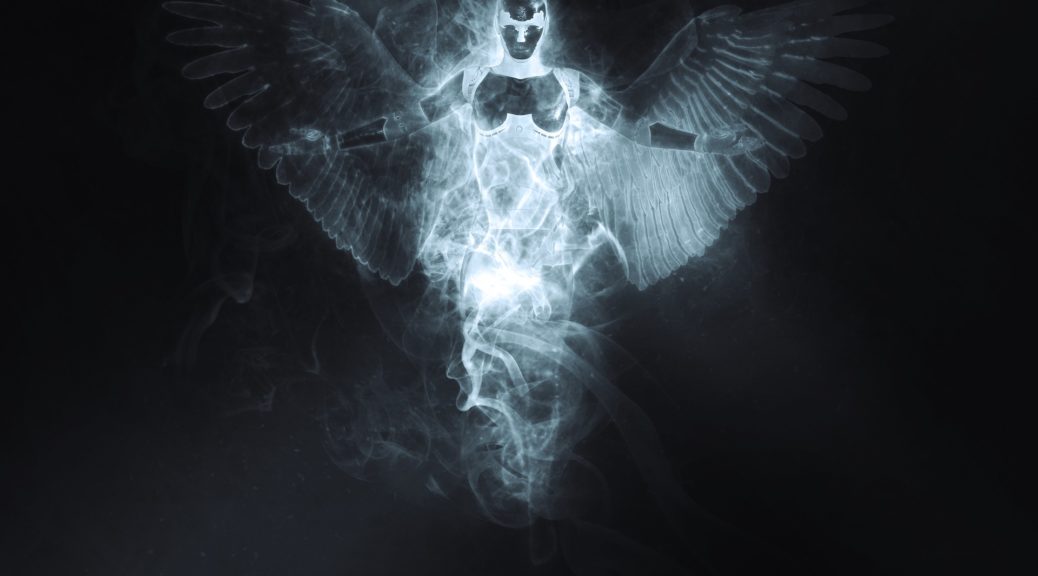Shamans and Charlatans
I ran across a person who is making money hand over fist with her “channeling” archangels. Now, you might tell me that I’m just bitter because I don’t make tons of money like she does. Okay, you might be right there. But I think charging a lot of money for a “gift” from a supernatural entity smacks of charlatanism. Here’s why I think that they might be a charlatan.
What are Angels?
Of all the Christian constructs, I’m more inclined to accept angels and archangels over other  supernatural beings. The concept of the angel, that is a messenger of the gods, goes back a fairly long ways in history. The concept isn’t linked just to the Abrahamic beliefs. The word, “angel,” comes from the Greek word, angelos, meaning “messenger.” The Sumerians were the first to have angels. They even worshiped a type of personal angel, similar to our Fygia that were, in essence, guardian angels. The Babylonians continued with angels and demons, which no doubt influenced the Jewish belief system, and thereby Christianity.
supernatural beings. The concept of the angel, that is a messenger of the gods, goes back a fairly long ways in history. The concept isn’t linked just to the Abrahamic beliefs. The word, “angel,” comes from the Greek word, angelos, meaning “messenger.” The Sumerians were the first to have angels. They even worshiped a type of personal angel, similar to our Fygia that were, in essence, guardian angels. The Babylonians continued with angels and demons, which no doubt influenced the Jewish belief system, and thereby Christianity.
A UPG warning ahead (so you know). I believe that the so-called angels of Christianity are actually gods from earlier religions, and that our gods have occasionally taken their forms (as well as forms of the Christian god) to appear to people who eventually become Heathens. This is my experience, and you can take that with a grain of salt. I know, in my case, Tyr has done so, and I suspect Odin has as well. I also suspect other spirits and supernatural entities have taken the guise of a Christian angel to get their message heard.
Charging for Communing
![Carol M. Highsmith [Public domain], via Wikimedia Commons](https://www.rationalheathen.com/wp-content/uploads/2018/08/Snake-oil_salesman_Professor_Thaddeus_Schmidlap_at_Enchanted_Springs_Ranch_Boerne_Texas_USA_28650a-200x300.jpg) The concept of communing with angels and archangels doesn’t seem that farfetched to me, as I’ve noted. But the concept of charging people a monthly fee for their insight sends off warning bells as being a charlatan. They claim that people won’t believe their message if they don’t charge something, but getting rich off advice given by the minions of a poor Jewish carpenter seems a bit hypocritical. Okay, a lot hypocritical.
The concept of communing with angels and archangels doesn’t seem that farfetched to me, as I’ve noted. But the concept of charging people a monthly fee for their insight sends off warning bells as being a charlatan. They claim that people won’t believe their message if they don’t charge something, but getting rich off advice given by the minions of a poor Jewish carpenter seems a bit hypocritical. Okay, a lot hypocritical.
I remember being in a panel at a SF convention and using runes on someone else, rather than myself. I was stunned to find people all around me who charged for doing that sort of thing with their Tarot cards. Never mind that I ended up being more accurate than they were. That’s really not a boast. I felt so out of my league with those people, that I ended up being stunned at my own accuracy.
Occasionally I have charged for my rune draws, but it’s a nominal fee — like $5. I am very cautious about it, because I really don’t know if it works well enough to change people’s lives. And quite honestly, the gods are the gods. The gods are not our bitches. They don’t come running when we call to them, nor do they do things we ask of them, unless they think it’s a good idea. I suspect angels–if they really do exist–have better things to do than counsel people on their day-to-day lives. Yeah, and if I recall archangels seem to have lots of things to do besides talk to our silly asses day-to-day. The gods do, I know that.
 Yes, the runes are the runes. They may or may not tap into a god’s psyche. And one could claim, I suppose, that you spent umpty umpty bucks becoming a channeler. You know how much training I had with the runes? Zilch, other than books. You know how much training I had contacting gods? Yep, zilch, nada, none. And yet, I’ve gotten some interesting contacts.
Yes, the runes are the runes. They may or may not tap into a god’s psyche. And one could claim, I suppose, that you spent umpty umpty bucks becoming a channeler. You know how much training I had with the runes? Zilch, other than books. You know how much training I had contacting gods? Yep, zilch, nada, none. And yet, I’ve gotten some interesting contacts.
Communing with Angels
So, do I think the people actually commune with angels and archangels? Probably not. In most cases, as much as I hate to say it, they’re charlatans like those people who did toll-free Tarot readings and advise people of their love life. Maybe a few of them were actually legit, but most were just trying to make a buck off of incredibly gullible people.
Of those who are actually legit, I don’t think they’re talking to whom they think they are talking to.  For one thing, I don’t believe in the Christian god, and if he does exist, he’s not the god the Christians think he is. So, the angels and archangels could be damn near anyone or anything. Hels bells, it might even be a malevolent spirit. If I hazard a guess, I think they’re probably talking to a wight, if they’re talking to anything.
For one thing, I don’t believe in the Christian god, and if he does exist, he’s not the god the Christians think he is. So, the angels and archangels could be damn near anyone or anything. Hels bells, it might even be a malevolent spirit. If I hazard a guess, I think they’re probably talking to a wight, if they’re talking to anything.
So, How Does this Relate to Heathenism?
 For those getting into Heathenism, and for those who have been in Heathenism some time, it’s important to recognize when someone is blowing smoke up your ass. (As an aside, this term actually comes from an attempted “cure” by blowing smoke up someone’s ass. I know, TMI.) Basically if someone is demanding lots of money for something that isn’t particularly well defined, such as prognostication, you may want to ask a lot of questions. Questions include:
For those getting into Heathenism, and for those who have been in Heathenism some time, it’s important to recognize when someone is blowing smoke up your ass. (As an aside, this term actually comes from an attempted “cure” by blowing smoke up someone’s ass. I know, TMI.) Basically if someone is demanding lots of money for something that isn’t particularly well defined, such as prognostication, you may want to ask a lot of questions. Questions include:
- How do I know that you’re really talking to <name that entity or god> and not just ripping me off?
- What do I get in return for my money?
- Who made you the Asa-Pope and why should I believe you?
I know, I know. I’m a wet blanket here. Look, there are plenty of major religions out there begging for money who have amazingly gilded churches. The Catholic Church is just one of them.
Where Does the Rational Heathen Fit in?

At this point, if you haven’t read a lot by me, you’re probably wondering what the fuck am I doing and what am I selling? Look, I know I’ve mentioned that I’ve had several conversations with our gods, but I give the information I think is pertinent freely. Yeah, yeah, I do have a premium version of this site and a pay wall on some pieces, but I’m pretty up front when I’m telling you that what you’re paying for is to keep me writing about the stuff you like to hear about.
I’m not lying to you and saying that Tyr has a special message for you if you only pay me $29.99 a month. (He doesn’t, by the way.) I don’t tell you I’m taking the money and saving souls while lining my pockets with the cash. (You’re going to Hel, by the way, if a god doesn’t claim you or if you haven’t died in battle.) What I tell you is that I could use some help monetarily and if you like what you’re reading and want to support my endeavors, I’d appreciate if you could at least pitch in a buck or two to at least keep the blog and the Internet up.
Maybe I’m not thinking big enough on this whole archangel thing. Maybe I need to channel those, charge people $25 a month, and have my own videos…
Nah. I’d probably get Weeping Angels. In which case, we’re all screwed.
How a God Inspired My Post
Sometimes I’m at a total lost when it comes to what I should write for the Rational Heathen. I look over my past writings, peruse the pagan blogs, then the Christian and atheist blogs, and then end up playing Age of Empires. See? I really do work on this.
The past several days I was beating my head against the proverbial writing wall, so I just gave up and worked on some other things. Then, in the morning when I was waking up, I heard a god…
Why Unverified Personal Gnosis should not be Dreaded
 If you’ve been a Heathen for any amount of time, you’ve heard of UPG or Unverified Personal Gnosis. If you don’t know what that is, let me explain. It’s when you have contact with our gods in the forms of communication, thoughts, or inspiration that cannot be verified because they are personal. They can be little things, such as knowing that Freyja loves chocolate (she does, by the way). Or UPG can be big, such as the hand of Thor grabbing you and demanding that you become his gothi or gythia. (Far be it from me to tell you otherwise.) So, what’s the big deal with Unverified Personal Gnosis, and why is anyone fussing over it?
If you’ve been a Heathen for any amount of time, you’ve heard of UPG or Unverified Personal Gnosis. If you don’t know what that is, let me explain. It’s when you have contact with our gods in the forms of communication, thoughts, or inspiration that cannot be verified because they are personal. They can be little things, such as knowing that Freyja loves chocolate (she does, by the way). Or UPG can be big, such as the hand of Thor grabbing you and demanding that you become his gothi or gythia. (Far be it from me to tell you otherwise.) So, what’s the big deal with Unverified Personal Gnosis, and why is anyone fussing over it?
What’s All the Fuss?
People fus s over Unverified Personal Gnosis because it is something that isn’t easily provable. It’s personal, meaning that only one person has had that revelation. We can’t go back and quantify that the gods really did speak to that person. To use logic, it’s very hard to prove a negative.
s over Unverified Personal Gnosis because it is something that isn’t easily provable. It’s personal, meaning that only one person has had that revelation. We can’t go back and quantify that the gods really did speak to that person. To use logic, it’s very hard to prove a negative.
Let’s take my assertion that Freyja loves chocolate. You might ask me how I know that. It could be anything along the lines that chocolate makes people feel like they do when in love, Freyja always accepts my petition when I offer a blot of chocolate, or Freyja told me she loves expensive organic, fair trade, 95 percent pure cocoa chocolate. Any one of those could be the reason I give you, and it’s up to you to decide if that really did happen, if I’m a bit crazy (or on mind altering substances), or if I lied to you. Maybe you talked to Freyja and she told you she hates chocolate. Or maybe she likes the cheap chocolate from two Halloweens ago.
Whatever. The point is that as Unverified Personal Gnosis, the knowledge obtained can’t be readily verified because it is personal. It’s my word against yours. And with some people, it’s in the realm of woo-woo and make believe.
 Can Unverified Personal Gnosis be Verified?
Can Unverified Personal Gnosis be Verified?
The question then is whether UPGs can shift into the realm of being verified. That is a good question, but I suspect that since we just can’t call up the gods any time we feel like it, the answer is no. Even so, sometimes people can corroborate experiences. When I received some very amazing UPGs, I actually mentioned them to a gythia or two. They could confirm that the information I received fell in line with what they knew of those particular gods. Some of what I experienced were similar to what the gythias’ own UPGs were about. In other words, I felt fairly certain about my experiences. Whether anyone else thinks they’re real is another matter.
I’ve known people who have claimed to be god-wives. I honestly can’t say that I believe their experiences 100 percent, but that is their UPG and not mine. My UPG doesn’t conflict with theirs, so I really can’t say that it didn’t happen. But at the same time, there’s no proof that someone hasn’t married Odin or Loki or Thor, just as there is no scientific proof that any of the gods actually exist.
The Burden of Proof Lies with the Person Making the Assertion
Logic dictates that the person who makes the assertion is the one who needs to provide proof. For example, if I assert that there is a pink unicorn on my front lawn, I have the duty to prove to anyone that there really is a pink unicorn on my front lawn if I want people to believe it. Otherwise, it’s my lawn and my imaginary pink unicorn amusing just me and the rest of the world doesn’t care. Likewise, we can claim there is a Thor, Tyr, and Odin, but if we don’t provide substantial proof, their existence is a matter of faith. In other words, you won’t win any logic debates with an atheist if you pull out the faith card.
Proof in the gods’ existence doesn’t mean people had oral traditions about them and wrote them down some 800 to 1000 years ago. Archaeological finds that verify people worshiped these gods is not proof, either. Proof means that you can produce undeniable evidence of the gods’ existence which can be duplicated by others using your methodology. So, our Unverified Personal Gnosis is just that — unverified.
Enter the Recon (Or Why Accept Historical UPGs and not Modern Day UPG?)
 (Oh shit, someone knew I was going to drag them into this.)
(Oh shit, someone knew I was going to drag them into this.)
Some reconstructionists tend to be lean more toward the atheist beliefs (or lack thereof) and less toward faith. ( I say “some” because I do know some recons who do accept UPGs as part of our religion.) These so-called Heathens will tend to dismiss, and even make fun of, other people’s Unverified Personal Gnosis. This is a religion, not a LARP with extra study.
That being said, I have to wonder why they are quick to accept past Unverified Personal Gnosis and not modern day UPGs. At one time, every story we have about the gods and wights came from someone’s UPG somewhere. It stands to reason that we can’t possibly verify any of the myths and legends we have about our gods, so either we accept them as UPGs and move on, or we thoroughly discount them as having any basis in fact.
Just because we find some stories in the Eddas and other documents as being historical does not mean that the entire piece can be taken as purely factual. We know this because science proves that our world isn’t made from the body of Ymir, there was no giant cow licking rime ice to create the first gods, and earthquakes do not come from Loki being splashed in the face with venom.
Accept Unverified Personal Gnosis for What it is
UPGs are, by definition, personal. My UPGs may sometimes contradict yours, should you have them, and other people’s UPGS may contradict each others. Some UPGs will be shit made up by people, whether because they want to feel important, misunderstand what happened to them, or because they are mentally ill. I suspect that Unverified Personal Gnosis acted that way with our ancestors.
 UPGs had to be the way our ancestors learned about the gods. Think about it. There wasn’t a giant classroom with a bunch of Heathens sitting around throwing spitwads at each other while Odin tried to teach them cosmology. (Or was it Tyr?) I can just imagine Loki teaching everyone how to misbehave while Thor comes in to maintain order. Yeah, warped mind. Deal with it.
UPGs had to be the way our ancestors learned about the gods. Think about it. There wasn’t a giant classroom with a bunch of Heathens sitting around throwing spitwads at each other while Odin tried to teach them cosmology. (Or was it Tyr?) I can just imagine Loki teaching everyone how to misbehave while Thor comes in to maintain order. Yeah, warped mind. Deal with it.
But I digress. Our myths and legends sprang mostly from UPGs. People in certain kindreds accepted UPGs from others who were respected in the community and UPGs from those whose stories corroborated. Different places most likely had their own stories and even tutelary gods and goddesses, but their stories have morphed or outright disappeared with the coming of Christianity.
My point is that we should not shun UPGs, but we should embrace them. We have a chance to rebuild our Heathen past and blend it with today’s knowledge. We can do so by recognizing UPGs for what they are and accepting those that make the most sense.
Getting Bitch-Slapped by the Gods
This is premium content. You can subscribe HERE and log in HERE to view this content.
Get the Daily Pass for just 99 cents and read all the restricted content you want.
The Dreaded Unverified Personal Gnosis
At some point, if we talk about our experiences in Heathenry, someone inevitably brings up Unverified Personal Gnosis. I’d actually would prefer to ignore the whole UPG side of Northern paganism, but seeing as UPG dragged me into being a heathen, I suppose I should talk about it in some rational manner. (Rational manner, Rational Heathen — get it?) So, I’m tackling the tough questions and looking hard at the section of UPG.
Warning: UPG Ahead!
 simple as idea that we get that we think is “divinely inspired,” or it can be a full-on visit by a deity. It’s “unverified” because nobody else experienced it, or we can’t hold it up to the light of science and measure it as “real.” In fact, you could take the whole lot of UPG experience and claim we’re just a bunch of crackpots who are off our meds (or smoking way too much shit), and I wouldn’t necessarily argue with you. It could be that, but some of the UPG I’ve experience was when I was stone-cold sober, and talking with gythias seem to confirm what I experienced. So, I have one of two choices to consider: I’m crazy and this is all in my head, or this could have happened and I’m mostly sane.
simple as idea that we get that we think is “divinely inspired,” or it can be a full-on visit by a deity. It’s “unverified” because nobody else experienced it, or we can’t hold it up to the light of science and measure it as “real.” In fact, you could take the whole lot of UPG experience and claim we’re just a bunch of crackpots who are off our meds (or smoking way too much shit), and I wouldn’t necessarily argue with you. It could be that, but some of the UPG I’ve experience was when I was stone-cold sober, and talking with gythias seem to confirm what I experienced. So, I have one of two choices to consider: I’m crazy and this is all in my head, or this could have happened and I’m mostly sane.The problem is how do you know?
 Am I Crazy, or was that Thor?
Am I Crazy, or was that Thor?
Lots of people have what could be considered UPGs when it comes to their religion. The fact that there are some 5000 religions out there, each with people (alive or deceased) claiming they’ve spoken to gods, suggest that there are plenty of people who are either delusional or who actually have gods who speak to them. And a majority of people out there tend to believe these people, whether it is Christianity, Islam, Judaism, Hinduism, Buddhism, Shintoism, or any other -ism or -ity you care to name. The simple answer is often the most likely: we’re all fucking crazy and we’re all in some sort of state of self delusion.
But look at the numbers of Christians who believe that the wine and bread becomes Christ’s body and blood through transmogrification, or believe that Christ rose from the dead. Look how many Muslims believe that the archangel Gabriel spoke to Mohammed. Look at the people in other religions who believe in ancestor worship, such as in Shintoism. Then there are plenty of pagans who have spoken with their gods. What gives?
At this point, you’re thinking I’m probably recommending that you stick with atheism and be done with it. That’s really not what I’m thinking, although atheism would probably do some folks a world of good, methinks. At one time, I would’ve told you that it was all in your head, but having experienced UPGs, I have to reconsider them from a rational point.
What Changed My Mind
 A few months after Tyr approached me, I nearly died in an accident. I’ll spare you the gruesome details but suffice to say I woke up in the hospital not remembering much except a bunch of convoluted dreams. These dreams were actually reality–they happened. But they were unlike any reality that I experienced. For one thing, it took awhile for me to remember them or what may have happened. To this day, I can’t say with any certainty what did happen precisely. On the flip side, I remember some dreams better than reality — and that left me totally unnerved. It still does, and that brought into sharp focus what reality exactly is: reality is how we perceive it. Our senses and our mind can be tricked at any time, and even at the quantum level, things can get weird and be perceived one way when we observe it and another way when we do not.
A few months after Tyr approached me, I nearly died in an accident. I’ll spare you the gruesome details but suffice to say I woke up in the hospital not remembering much except a bunch of convoluted dreams. These dreams were actually reality–they happened. But they were unlike any reality that I experienced. For one thing, it took awhile for me to remember them or what may have happened. To this day, I can’t say with any certainty what did happen precisely. On the flip side, I remember some dreams better than reality — and that left me totally unnerved. It still does, and that brought into sharp focus what reality exactly is: reality is how we perceive it. Our senses and our mind can be tricked at any time, and even at the quantum level, things can get weird and be perceived one way when we observe it and another way when we do not.What is Reality? — the 64 Million Dollar Question
I realized by this accident that we really don’t know what reality is in the true sense. We can think we imagined things that were true, and think things that are true that we have imagined. The line can get extremely blurry from time to time when people witness something, as any good cop or detective will tell you. Unless you have a camera or a trained observer, people are likely to come up with all sorts of eyewitness accounts. My question is does it make it less true because someone saw it differently? Can the camera “fix” the state like the quantum physics experiment? Probably not, but who really knows?
Our senses tell us whether things are true or not, but our senses can be deceived in all sorts of ways. Our mind can think through things logically and still be wrong because we don’t have all the facts. So, I was left feeling incredibly insecure about what everything really was.
That’s when Loki showed up.
 Enter Loki, Stage Right.
Enter Loki, Stage Right.
Apparently I wasn’t dealing with the entire concept very well, and I wasn’t really taking care of myself. I was out of the hospital and working hard to bring in money again. (You think you’re poor? Get injured when you’re self employed.) Loki showed up at Tyr’s request and nagged me to take care of myself. At first, it was amusing. Then, it got annoying. Loki took great delight in annoying me. Then, he got bored when I started to pay attention.
Loki is truly the ADHD kid of the gods. A lot of people see him as evil, but I don’t see it quite that black and white. He’s capable of great mischief when he wants to do it, but I recognize the times when he can be a great ally. This doesn’t make me a Lokean, but it does make me somewhat more sympathetic to him than some people are.
But Back to UPG…
 At one time, our religion had to have some sort of UPG or it would’ve never existed. Humans did have to communicate with our gods somehow (or made up good stories about communicating with our gods) or we wouldn’t have Heathenry or Asatru today. If we truly believe that our gods are living, then perhaps this is the way they communicate with us.
At one time, our religion had to have some sort of UPG or it would’ve never existed. Humans did have to communicate with our gods somehow (or made up good stories about communicating with our gods) or we wouldn’t have Heathenry or Asatru today. If we truly believe that our gods are living, then perhaps this is the way they communicate with us.My thoughts on UPG are kind of mixed. I’ve seen some shit others have also seen that I can only attribute to a god or goddess (or weird blind luck). My thoughts are if you get UPGs, and they help you along in this world, and harm no one, then who is to say they are bad? I mean it’s one thing if a god tells you to care for yourself, and it’s another thing if you think that god tells you to harm someone. As long as they are not hurting you or someone else (or don’t tell you to do destructive things), I’m willing to consider that you’ve heard them. And if your UPG matches mine and others, I’m going to think it’s a distinct possibility.
Is Thor Stupid?
 It seems to me that there are two camps when it comes to Thor: those who think he’s at least average intelligence (for a god, whatever that is), and those who think he’s maybe not as dumb as a post, but would be challenged by one occasionally. Since I picked on Thor last week, I’m going to test his good graces again and tackle his intellect.
It seems to me that there are two camps when it comes to Thor: those who think he’s at least average intelligence (for a god, whatever that is), and those who think he’s maybe not as dumb as a post, but would be challenged by one occasionally. Since I picked on Thor last week, I’m going to test his good graces again and tackle his intellect.
All Brawn and No Brains
I suspect that thinking Thor is stupid is a relatively recent phenomena which has to do with our current stereotypes. Although the stereotypes are changing, the common stereotype of the muscle man is the stupid jock. I think, rightly or wrongly, that stereotype has been crafted over the years. Although science disagrees that people who are athletic are stupid, it’s still a stereotype that is perpetuated. I did a quick look on the Internet in the quest for the search of why muscular people, particularly men, are considered stupid. I found a reference on that oh-so-accurate Wikipedia (that was sarcasm, for those not paying attention), and even a blog which mentions a study on it.
My Own Experience with Jocks
Growing up, I had the joy of dealing with bullies, and dealing with kids who were naturally better at sports. I had undiagnosed asthma which precluded me from doing well in physical activities when I was younger. This was during a time when people thought asthma was “all in your head.” It took years for me to admit I have it, and now that I do, life is much, much easier. But I digress. Most of those kids were, well — not the brainiest — and those who were smart, tended to hide it for fear of being bullied. To add to the stereotype, I grew up when nerdy guys in lab coats got people to the moon.
In college, I saw kids who got scholarships and were treated like gold because they were good in sports. While not all the jocks were stupid, many were not the sharpest knives in the drawer, because they often were given a pass. I went into the sciences, geek girl that I am. So, the stupid jock was commonplace.
My junior and senior year, I worked out and trained in martial arts. So, I got to know the weightlifters. Many had been the kids everyone picked on when they were small; a good portion of them were introverts. So, they did the best thing they could think of: not become a target. Many of the people I knew in martial arts were smart. Yes, there were the average and idiots in the group as well, but most I would categorize as being clever enough.
So, why the dichotomy?
When We Moved from Agrarian to Industrial
I think that the shift in emphasis started in the 18th century, but really didn’t take hold until the 19th century and early 20th century where people started separating themselves into white collar and blue collar (note: this is not a rich versus poor argument). My parents looked down on those who didn’t have office jobs as being unable to be smart enough to attain those positions. Never mind that many of the blue collar jobs paid better than white collar jobs. I suspect that this attitude was fostered though the colleges and through those who were able to work pushing paper for a living. I suspect that the GI Bill after WWII and emphasis into getting higher degrees also pushed more people into thinking that manual labor means you can’t hack an office job.
I’ve already mentioned the moonshots, which were a result of the cold war. In fact, I suspect that the emphasis going into science and other intellectual activities caused a bigger split, suggesting that you couldn’t be both strong and smart. Sure, we had our Hollywood heroes, but they emphasized not strength, per se, but beauty. Professional athletes were always admired, but they were never considered brilliant, except when it pertained to their performance
When Physical Prowess was Admired
It used to not be that way. Prowess in sports suggested you were good on the battlefield. Being physically fit has paramount before firearms became prevalent. After all, whether you lived or died, whether your family would survive, and whether you had enough food was largely dependent on your fitness and skill as a hunter, warrior, and farmer. Firearms replaced swords, pikes, maces, and knives, and armor went away. No longer did you have to carry some 50 to 70 pounds of armor and weaponry. While there were wars, most problems were resolved in torte.
Brains and brawn weren’t considered mutually exclusive. Many warriors were considered clever and intelligent.
So, What About Thor?
I feel that Thor has gotten a bad rap, not because he’s stupid, but because he has likable characteristics that make him more…well, human. Somehow he loses Mjolnir, and has to go in drag to get it back. He journeys with Loki to Jotunheim and yes, he is tricked by the Jotun’s magic, but then so is Loki. Then, there’s the story how Thor tricks a dwarf who is about to marry his daughter in the Alvissmal where the gods promised Thor’s daughter while he was away. Tricking a dwarf to stay above ground after sunrise (and thus turned to stone) doesn’t suggest a stupid god.
 My UPG Take on Thor
My UPG Take on Thor
I am not an expert when it comes to Thor, but what little dealings I’ve had with him shows me a strong and compassionate champion. Yes, he has a temper; yes, he is not beyond using his strength. But I have noticed that he is more likely to forgive if someone makes an error like Thjálfi did in breaking the bone of his goat and sucking out the marrow. As one of the gods who favors humanity, I can think of no better champion.
I don’t think Thor is stupid. I think that because his strength is so great, we sometimes don’t take into account that Thor is smart too. After all, he’s the son of Odin and Jord. Would Odin have a stupid kid? I don’t think so.
You Ain’t a Priest/Priestess Just Because the Gods Spoke to You
Well, I’ve been dealing with some wankers and wandered over to their web pages and found that they were proclaiming their priesthood for all to see. Seriously? Seriously? It’s one thing to think you’ve heard the gods through dreams and meditations, and another thing entirely to call yourself a godhi/gythia because of said visions.
So, if you’re one of those, I’m going to bade you to stop reading right fucking now. Take a breath and have some chamomile tea. Block my posts on Facebook, so you never have to read them again. And bask in the knowledge that I haven’t upset your apple cart.
Now for the rest of you who won’t screw themselves into the ceiling over this post, please feel free to continue…
Mighty Presumptuous, Ain’t It?
You have to wonder what the mindset is of someone who has become a heathen or even joined up with Asatru and started calling themselves a godhi/gythia. What kind of person has that big of an ego, (or that much delusion?), to call themselves that without agreement from some kind of community? It’s one thing, I suppose, if you went through training, seen visions without LSD or peyote, and were generally acknowledged as a godhi/gythia by the people of your kindred. It’s another thing to slap that label on your mug because you swore the raven that cawed to you said “I am Odin.”
Talking with a God/Goddess Isn’t Enough
Look, I’m not doubting that you could’ve had that experience. Hels bells, I’ve had those type of
experiences, and the best I could come up with as a title is The Rational Heathen. Not exactly god-inspired, if you think about it. I had to fight the atheists for that name on my blog. (Which brings me back to last week’s post.) My point is that there’s enough of us who have had those types of nudges from the gods and goddesses to the point where we could all be considered godhi/gythia in some way if you were using “the gods spoke to me” as your qualification for priest/priestess-hood. I’m sorry, but as unique as your experience might be to you, it isn’t that unique. There are enough people I know in the pagan/heathen community who have spoken with our pantheon on more than one occasion. And some, I hate to say, may simply be undiagnosed schizophrenia.
Did a God Talk to You, or is it Schizophrenia?
TL;DR Point: Schizophrenia causes people to hallucinate, and while it affects only 1% of the population, it still could be the reason some people believe they talk to gods. If you are so certain you know what the gods want, be sure you don’t have this disease…
 According to the National Institute of Mental Health, schizophrenia hits about 1 percent of the population, or somewhere between 7 to 8 people out of 1000. I am NOT saying that those of us with dreams, insights, connections with the gods, etc are schizophrenic, but I have to point out that this could account for SOME people. When there are 320 million people in the United States alone, that means there are about 3.2 million people in the US that have schizophrenia.
According to the National Institute of Mental Health, schizophrenia hits about 1 percent of the population, or somewhere between 7 to 8 people out of 1000. I am NOT saying that those of us with dreams, insights, connections with the gods, etc are schizophrenic, but I have to point out that this could account for SOME people. When there are 320 million people in the United States alone, that means there are about 3.2 million people in the US that have schizophrenia.
Now, I’m not saying you are schizophrenic. I’m not saying I am schizophrenic. But the numbers, statistically speaking, do point to a fairly large number that in this country alone could encompass most — if not all — of our worldwide believers. But thankfully, we have to account for the affected Christians, Muslims, Jews, Hindus, Buddhists, Pagans, and whatnot, so I suspect the percentage among the Heathens is around the 1 percent as well. Maybe it’s a bit higher because our religion isn’t “the norm.” Maybe it’s lower. Regardless, if we point to all of Heathenry, we can probably say a small portion are schizophrenic.
I bring schizophrenia up only because it does have a tendency to cause people hearing voices or having delusions. Whether it’s the belief a god or gods talked to you, or whether you think your dishwasher has secret conversations with the refrigerator, this disease can account for much. And not surprisingly, many schizophrenics aren’t even diagnosed.
If you are so certain you know what the gods and goddesses want, be sure you don’t have this disease.
I’m Okay; You’re Okay if You’ve Liked My Page
TL;DR: Don’t be an asshole and claim you’re a godhi/gythia to bully people whom don’t necessarily agree with you.
 I’m under the opinion that most folk who have claimed to have had dreams or gods/goddesses inspired UPGs while meditating or in a trance/dream state are okay and (mostly) rational people. Many I call my friends. I’ve talked about Lokeans in previous blogs, and many of them are cool people. I would not put them under the “crazy” label.
I’m under the opinion that most folk who have claimed to have had dreams or gods/goddesses inspired UPGs while meditating or in a trance/dream state are okay and (mostly) rational people. Many I call my friends. I’ve talked about Lokeans in previous blogs, and many of them are cool people. I would not put them under the “crazy” label.
I honestly don’t care if you’ve had visions from the gods or not. What I care about is if you’re an asshole about it. Part of that asshole behavior is presuming you’re a godhi or gythia because of it and using those conversations as your Norse pantheon god-given right to bully the rest of us what to believe. Sweetie, it doesn’t work that way. For one thing, you aren’t the only one who has heard from the gods.
Studying Eddas and doing research doesn’t make a godhi/gythia. If it did, there would be a lot of scholars who are godhi/gythias who don’t believe in our gods. In fact, I’d probably qualify as a gythia with just that criteria because I did a fair amount of study in myths, legends, and dead languages. I even have a higher level degree that encompasses anthropology, legends, and languages.
Part of being a godhi or gythia is being recognized as such in the community. It has to do with knowing the lore and the runes, as well as a dedicated willingness to serve the community. As a non-gythia person, I’ve talked to a few people whom I respect whom I would call godhi or gythia. Very few. Like count them on one hand. What struck me about them was their willingness to share their knowledge and their overall kindness in helping me in my quest to be closer to our gods.
The people who are abusive, mean, and bullying, despite having someone think of them as a godhi/gythia are clearly NOT. Why do I say this? Think of the purpose of a godhi/gythia. They’re intended to help people in spiritual matters. They have a willingness to serve the community.
No, I’m NOT a Gythia
You’ll be relieved to hear that I don’t consider myself a gythia in any way. I don’t have a kindred, per se, and I don’t take myself that seriously. (You shouldn’t either, unless I’m being dead serious, which I can be, from time to time.) I don’t have much respect in the community and I don’t fancy myself a religious leader. While I do a fair amount of reading and studying, most of my waking hours are spent trying to make a living, not spending time reading Eddas and books on the subject. When I’m feeling cocky, I write this blog. Occasionally, people ask me for advice. I warn them up front that I’m pretty ignorant, but I am happy to at least give them my honest take on what they ask. Beyond that, I’m pretty much what you deal with: a low bullshit writer.
The Gods Have Given Me a Title!
No, seriously, they have. From now on, you will address me only as The Rational Heathen, Supreme Cynical Rabble-rouser. I am feeling quite pleased with myself, which means I’m probably going to do some more shit-stirring and poking-the-crazy than normal. I asked Loki for the title Supreme Shit-Stirrer, but he refused to give up that title. I then asked for Pokes-The-Crazy, but Odin wouldn’t give up that title either. So, I’m stuck with Supreme Cynical Rabble-rouser. It does have a ring to it, I’ll admit.
Some Things to Think About Before Dedicating Oneself to a God
This is premium content. You can subscribe HERE and log in HERE to view this content.
Get the Daily Pass for just 99 cents and read all the restricted content you want.
Why Bad Things Happen: One Heathen’s Perspective
Bad things happen. When I look at things like the Paris attacks, I can’t help but wonder why. And as a former Christian turned Heathen, it’s easy for me to fall into the “why did god/the gods let this happen?” mode. The words, “shit happens” really does embody the Heathen and pagan view, so you’re probably going to get my rationale when it comes to this. Here is my perspective on why shit happens.
Christian God Versus Reality
You’ll see me talking about the Christian god quite a bit, because, quite frankly, as Americans, we deal with a Christian-pervasive society. While it is true that some folks have grown up without being in Christian family, I think most of us still have the Christian influences in our lives. Growing up in a Christian household, I was told to trust in god. That god had a plan. That god would take care of me. That everything would be okay.
If you’ve gone through some tough times, you know damn well that reality is never that cut and dry. That bad things happen to good people all the time and bad people do get away with things. Sometimes we see karma in action, but more often, we are left wondering how in the Hel we can pick up our lives and move on.
I can point to many instances of bad things happening to good people: children having cancer, tornadoes and hurricanes killing good people, and terrorist attacks. In many cases, the victims were Christians and perhaps very good people. The Christian god was asleep at the wheel on that day when bad things happened, otherwise, he wouldn’t have let it happen, assuming he was an all-powerful and benevolent deity.
Why the Gods Don’t Interfere — at Least Not Much
I personally believe that no god is truly all-powerful. Some are more powerful than others, which makes sense. But none of them are everywhere or paying attention to everything. My own patron god doesn’t always hang around my life because, quite frankly, it’s boring to him. Other gods may pop in and out as they will, but they aren’t with me all the time. Yep, sometimes I’m alone.
I went through some trying times and, quite frankly, got a little snotty with one of the gods for “abandoning” me. He showed up in a dream later and told me that he couldn’t prevent what happened. It was the Wyrd, and he thought it sucked too. But he did have some solace for me, which made me hesitate and think about the situation. In retrospect, he could’ve told me to fuck off and send me back to whatever I decided: Christian, Agnostic, or Atheist. But he didn’t. Instead, he sought to console me, which was surprising. At least to me.
Our Place in the Wyrd
 Basically, we’re all stuck with our Wyrd or fate. We like to think of ourselves as masters of our destiny, but even science says that free will may be an illusion. This sucks big time. The only thing that affects the universe is our choices, and depending on what we decide, our decisions spin off another universe. That’s amazing, if it doesn’t make your head hurt. We coexist in the past, present, and future, but we can’t perceive those times because of our limited, linear thinking. Or to quote the good Doctor:
Basically, we’re all stuck with our Wyrd or fate. We like to think of ourselves as masters of our destiny, but even science says that free will may be an illusion. This sucks big time. The only thing that affects the universe is our choices, and depending on what we decide, our decisions spin off another universe. That’s amazing, if it doesn’t make your head hurt. We coexist in the past, present, and future, but we can’t perceive those times because of our limited, linear thinking. Or to quote the good Doctor:
“People assume that time is a strict progression of cause to effect but actually from a non-linear, non-subjective viewpoint, it’s more like a big ball of wibbly wobbly, timey wimey stuff…”
Yeah, I just quoted Doctor Who. Get over it.
Basically, if you believe in physics and science, some things are just beyond even the gods. The Norns are possibly the only ones who handle our destinies, but even then, they just spin, measure, and cut. They don’t show us what the measure of our lives look like.
What’s more, we really don’t know what else is going on beyond our simple point of view. There may be something; there may be nothing. We just may be in the wrong place at the wrong time.
What to Take Away from All This
Bad things happen. Good things happen. Not everything that happens is something we want. Sometimes it happens for a reason. More often, it happens for no particular reason other than our choices, or no choices, or a single quantum flip. Sometimes the gods can help us; other times they can’t. That’s why in the end we have to deal with all the unfair things life throws at us, as well as all the good things. When we as Heathens understand that our destiny is due to our choices combined with quantum physics, we can finally understand the nature of the universe and the gods just a little better.














